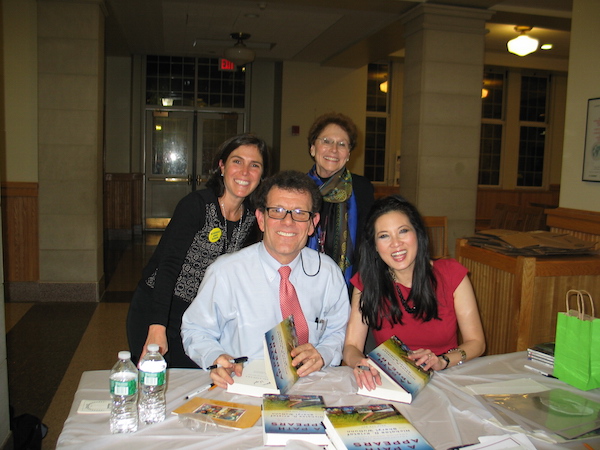Kristof and WuDunn Discuss New Book in Scarsdale
- Monday, 10 November 2014 16:15
- Last Updated: Monday, 10 November 2014 16:17
- Published: Monday, 10 November 2014 16:15
- Melissa Hellman
- Hits: 5306
 Even small acts of altruism can go a long way toward solving intractable global issues while providing the donors with a sense of pleasure and fulfillment. That was just one of the messages communicated by Scarsdale authors Nicholas D. Kristof and Sheryl WuDunn when they discussed their new book, A Path Appears: Transforming Lives, Creating Opportunity to a packed audience in Scarsdale on Thursday, November 6.
Even small acts of altruism can go a long way toward solving intractable global issues while providing the donors with a sense of pleasure and fulfillment. That was just one of the messages communicated by Scarsdale authors Nicholas D. Kristof and Sheryl WuDunn when they discussed their new book, A Path Appears: Transforming Lives, Creating Opportunity to a packed audience in Scarsdale on Thursday, November 6.
Kristof, a two-time Pulitzer Prize winner and New York Times columnist, is often called the "reporter's reporter" for his human rights advocacy and his efforts to give a voice to the voiceless. WuDunn is the first Asian-American reporter to win a Pulitzer Prize, a business executive, a best-selling author and is married to Kristof. She works with entrepreneurs in new media, media technology, and social enterprise at a small investment-banking boutique in NYC.
A Path Appears: Transforming Lives, Creating Opportunity is an inspirational call to altruistic action. It showcases philanthropic innovators around the world who are using research, evidence-based strategies, and brilliant ideas of their own to fight some of the twenty-first century's most intractable problems: poor early-childhood education, sex trafficking, inner-city violence, poverty and malnutrition, homelessness, and many others. In a glowing critique in The New York Times from October 16, 2014 reviewer Paul Collier wrote "If you want to carry on with your life just as it is, best give it a miss."
Kristof and WuDunn spoke to a crowded auditorium driving home some important points about altruism, charitable giving, and how poverty in early childhood can lead to a life of instability. However, it was not all doom and gloom ... in fact the whole point of the book is that even small efforts can have impact.
For example, just $3.50 can provide de-worming medicine for one year to one child in Africa. Treatment with this medicine removes a barrier that keeps children out of school. Every additional year of schooling a child in Africa receives can lead to a more much stable life. Check out www.givewell.org to find some organizations doing work in this area and see how small amounts of money can have impact.
Why don't more people get involved? Kristof referred to as the "empathy gap" and the idea of pointing fingers and laying blame on those who live in poverty rather than reaching out and lending a hand. In developed countries the well to do can lead insular lives without truly interacting with people who live in poverty. Without knowing an individual's story and struggles it is easy to see poverty as "moral failing". He encouraged people to reach out to those in need even as he acknowledged getting his heart broken many times by doing so. Though we have all had the "no good deed goes unpunished experience," Kristof encouraged the audience to keep exercising the muscle that drives them to engage in kind behavior and acts of charity. Kristof and WuDunn were eager to point out that study after study have shown that altruistic acts activate the same pleasure centers in the brains as are activated when receiving gifts, sometimes to an even higher degree. It really is better to give than to receive!
The authors spent time with the community at a reception following the event and signed copies of their book for audience members.
There are still a few signed books available for purchase through www.scarsdaleadultschool.org.
This event was co-sponsored by the Scarsdale Public Schools Interdependence Institute, Scarsdale Adult School, Scarsdale Council of Parent Teacher Associations, Scarsdale Teachers Institute, and Scarsdale Public Library.






